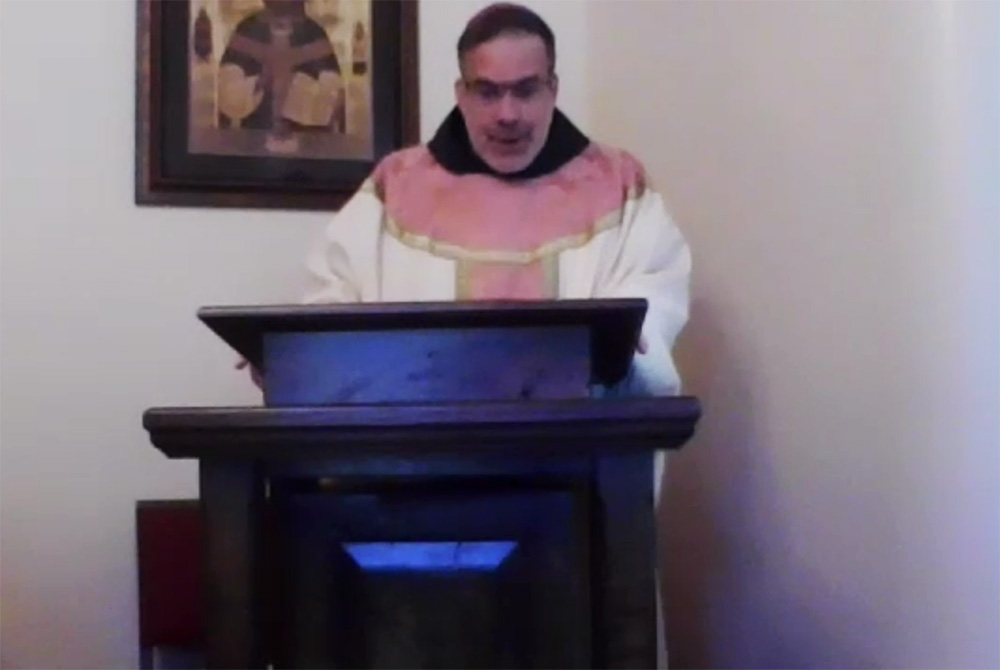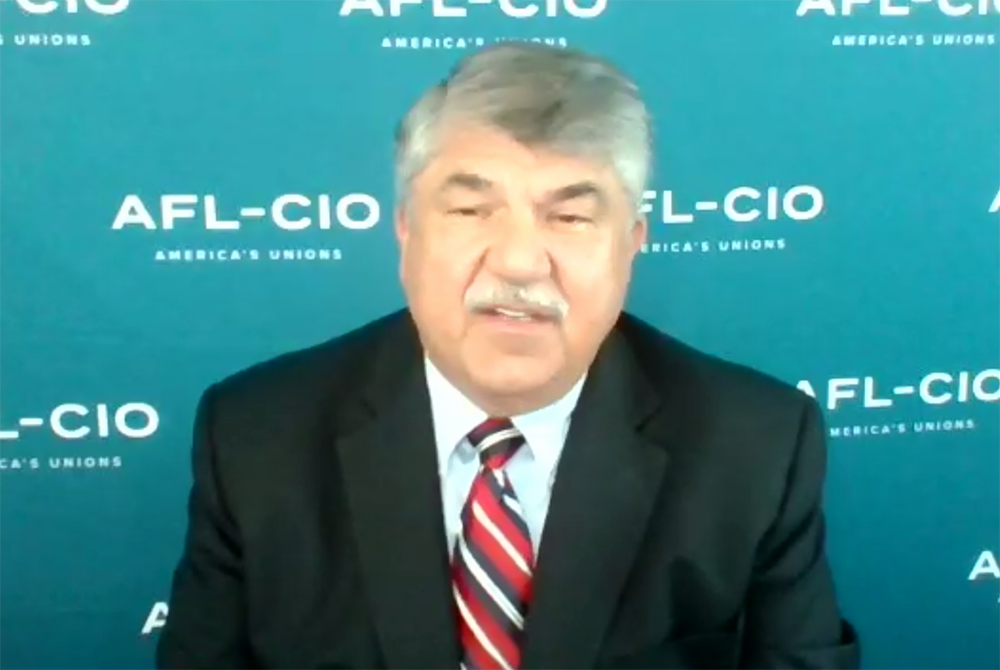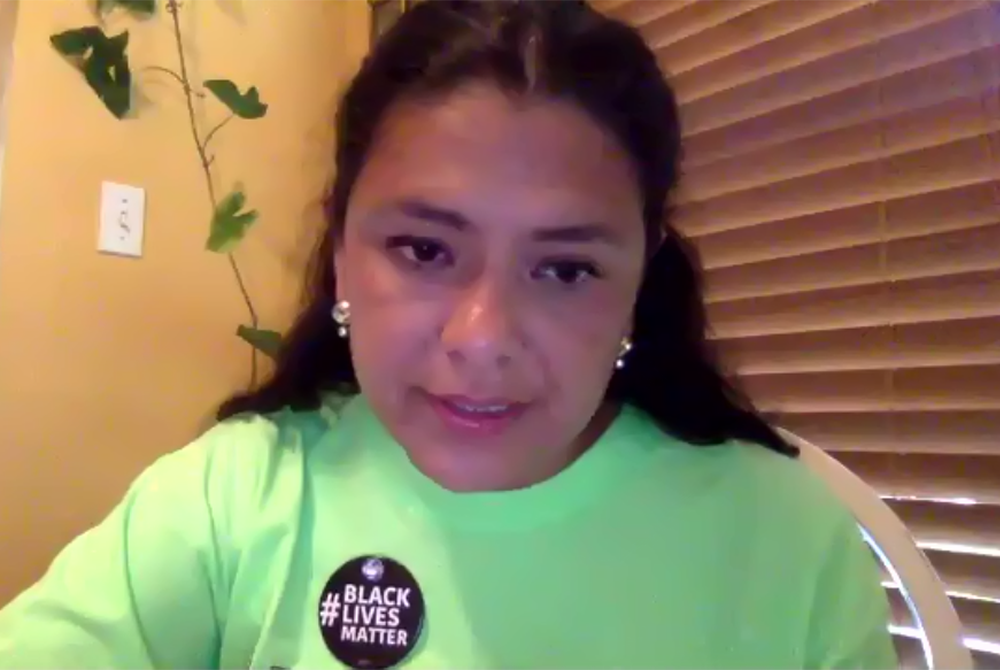
Bishop John Stowe of Lexington, Kentucky, said during a first ever virtual Labor Day Mass that the holiday was an occasion to stand in solidarity with essential workers who for too long have been overlooked or forgotten. (NCR screenshot)
The top brass of the country's labor movement joined forces with Catholic leaders for a first ever virtual Labor Day Mass where Bishop John Stowe of Lexington, Kentucky, said the holiday was an occasion to stand in solidarity with essential workers who for too long have been overlooked or forgotten.
Labor Day "invites us to consider not only the dignity of human work as a share in God's creation, but calls us to deepened solidarity with those who have been labeled 'essential workers' but too often treated as expendable when it comes to the profit margin," Stowe told the more than 1,000 online attendees of the Mass, which was organized by the Catholic Labor Network.
In January 2017, when Kentucky legislators debated "right to work" legislation aimed to limit workers from organizing, Stowe appealed to Catholic social teaching in encouraging lawmakers not to support the bill.
"In Catholic teaching, unions are described as an indispensable element of social life. Unions are to promote solidarity among workers. They are essential for economic justice and to protect the rights of workers," he said at the time. "The weakening of unions by so-called 'right to work' laws, has been shown to reduce wages and benefits overall in the states where such laws have been enacted. This cannot be seen as contributing to the common good."
On several occasions during his homily the Kentucky bishop referenced Jesus' own experience as the son of a manual laborer — a carpenter — who understood the dignity of work.
"The carpenter's son is in our midst as we face this pandemic and continue to struggle for the rights of workers in solidarity," he said.
He went on to offer a broad history of the church's long-standing support for unions and the rights of workers dating back to Pope Leo XIII, telling attendees that the 19th century pope "wrote, and inscribed into Catholic teaching, a foundational premise that workers had the right to organize to advocate collectively for fair pay and safe working conditions. He argued for a sense of the common good and for maintaining the proper balance between capital and labor, with each recognizing the need for the other and cooperating for the common good."
Stowe also invoked the late St. John Paul II, whom he said "had worked in a factory while attending an underground seminary" and "insisted that work must be 'subjective,' that is the worker should exercise autonomy and dominion, rather than allowing work to become 'merchandise,' bought and sold at the lowest price."
He went on to highlight the need to stand with migrant workers, both to improve the conditions in which many of them work, but also to provide permanent legal solutions to their often fraught documentation statuses.
"We know that the need for laborers draws people from places where the opportunities for work to support a family are quite limited, places where poverty and desperation create endless cycles of violence," Stowe said. "Yet for decades we have failed to create just immigration policies for the vast majority of hardworking immigrants and create legal pathways so that they can fully participate in the society they help to build and sustain."
The Mass, which was at times bilingual, included participation from the leadership of a number of the nation's top union members, among them Richard Trumka, president of the AFL-CIO.

AFL-CIO President Richard Trumka offers the first reading. (NCR screenshot)
In 2018, Trumka, who is head of the largest federation of unions in the United States, joined Cardinal Joseph Tobin of Newark, New Jersey, for a discussion on Pope Francis and the labor movement, and in recent years he has participated in and helped sponsor the Erroneous Autonomy conference series that explored the incompatible nature of libertarianism with Catholicism.
Texas AFL-CIO Secretary-Treasurer Montserrat Garibay, who offered several of the petitions during the prayers of the faithful, told NCR after the Mass that the event reminded her of the essential role the church plays in speaking out for workers' rights.
"To see that we stand with each other for the betterment of labor workers is important," she said. "We're living in very dark times, but when we're able to talk about our faith in a way that brings us together and praying for the women and men in our communities who are doing very hard work during the pandemic and to be able to uplift the work they are doing, I think that's an important thing."

Texas AFL-CIO Secretary-Treasurer Montserrat Garibay offers the Prayers of the Faithful. (NCR screenshot)
Vincent Alvarez, president of the New York City American Federation of Labor and Congress of Industrial Organizations, concurred, telling NCR that the country is facing a trio of crises: a public health catastrophe in which millions of Americans are sick from COVID-19, a massive economic recession with skyrocketing unemployment and an ongoing struggle for racial justice.
Alvarez said that while the labor movement and the Catholic Church have their own distinctive roles to play in combating each of those challenges, the Sept. 7 Labor Day Mass served as a reminder of the long history of the two institutions working together in shared cause.
"The teachings of the church complement the issues that we're dealing with on a regular basis," said Alvarez after the Mass.
"There's a direct connection between the work the labor movement does in protecting the rights and the dignity of working people and the teachings of our Catholic faith in recognizing that we're all part of the same universal church and children made in the image and likeness of God," he said.
Advertisement
Fr. Clete Kiley, a senior adviser at UniteHere International Union and a board member of the Catholic Labor Network, told NCR that "there's no greater collection of doctrine in support of unions, workers, and workers' rights than you find in Catholic social doctrine."
Kiley admitted that at times the church and its institutions fail to live up to that challenge in practicing what it preaches.
"We can be schizophrenic sometimes in practice, but not in the doctrine. That's clear," he continued.
"Part of it is that people don't know our social doctrine about the nature of work. We're so caught in this neoliberal, individualistic, capitalistic thing that we really miss out on issues like solidarity," said Kiley.
He pointed to Pope Leo XIII's encyclical Rerum Novarum, which concludes by telling workers that they should always be able to count on the pastoral support of the church, while also challenging pastors to "go to the workers."
Monday's Labor Day Mass, for Kiley, is one positive example of the church living out Pope Leo's command of going to the workers.
"It's exactly what we should be doing," he said.
[Christopher White is NCR national correspondent. His email address is cwhite@ncronline.org. Follow him on Twitter: @CWWhite212.]








